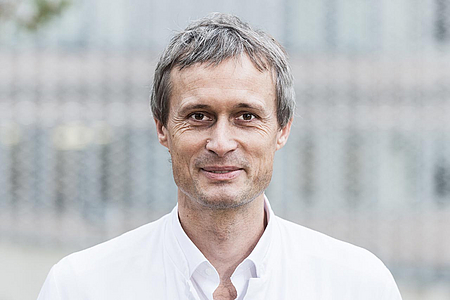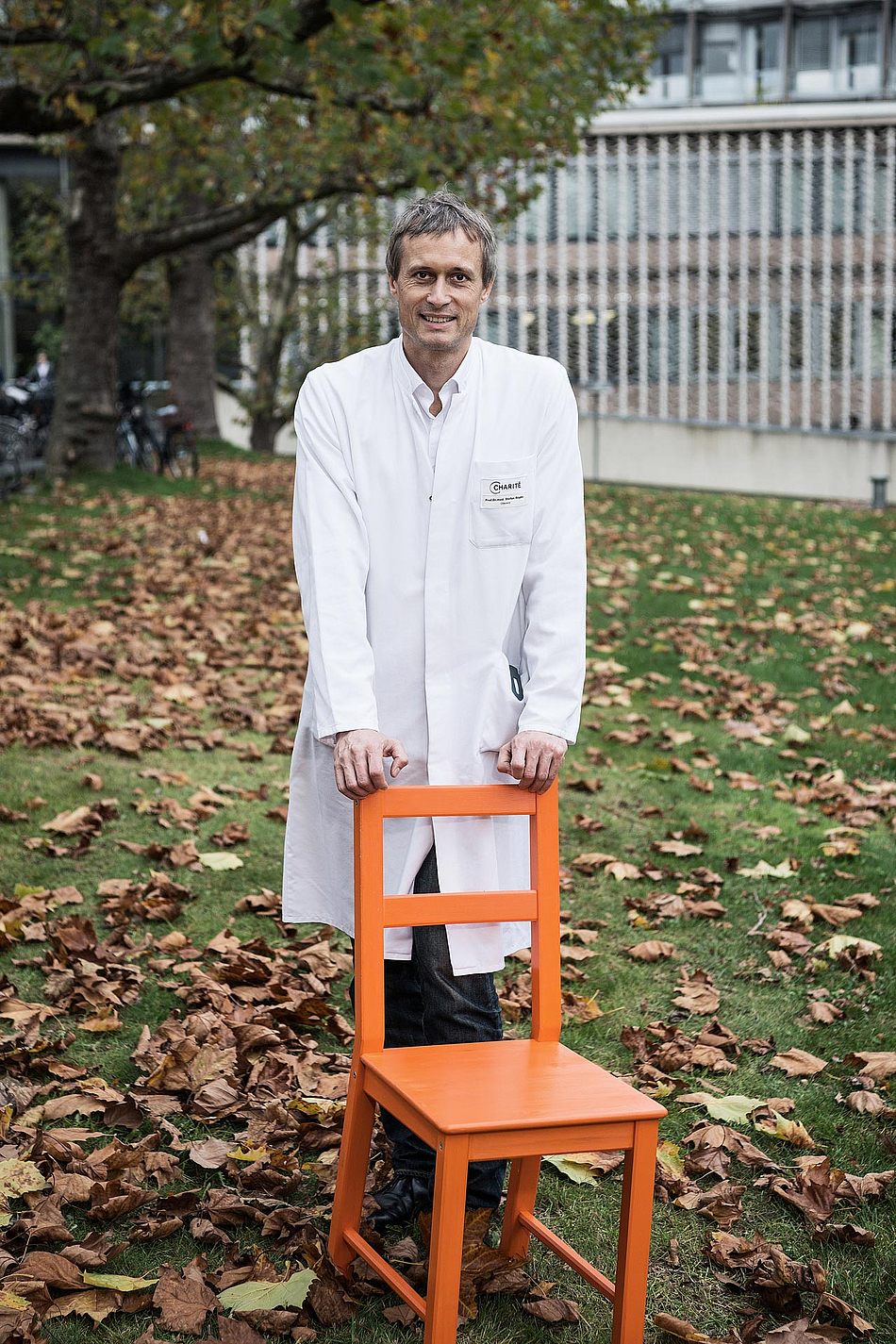Hard on the heels of stress
Many people already experienced incredible stress as schoolchildren when their math teacher summoned them to the blackboard to solve an equation in front of the whole class. The test subjects in a study conducted by Stefan Röpke and his research team on post-traumatic stress disorders (PTSD) have a similar experience: in the Trier Social Stress Test, test subjects have to give a lecture in front of a jury – only, no matter what the person says, the jury displays a very dismissive attitude. No wonder that causes stress in many people. By contrast, test subjects in the control group only have to recite the lecture to themselves. Following this, both groups are shown a film that can cause short-term symptoms of PTSD even in healthy people. The film contains images of undesired, disturbing events – for instance, images of car accidents, war scenes or extreme acts of violence.
Stefan Röpke, senior physician in Department of Psychiatry and Psychotherapy of the Charité, explains: “Human beings have the ability to notice stressful events more vividly, in order to not repeat mistakes or to encounter dangerous things with extra caution”. When mentally processing such events, many people experience intrusive memories. These are memories or images of a past event that obtrude repeatedly.” Similar stimuli, sounds or smells in their environment make PTSD sufferers feel as if they’re experiencing the event all over again. This can go so far that sufferers feel “torn from their everyday lives and even avoid certain situations, due to which their lives become ever more restricted,” says Röpke. These kinds of intrusive memories are often symptoms of a post-traumatic stress disorder. In the case of soldiers who return from deployment abroad, the public is at least partly sensitized to this issue. PTSD is also increasingly the subject of public discussion in connection with severely traumatized refugees.
At the clinic, Stefan Röpke and his team are confronted daily with the problem of intrusive memories in patients with PTSD. It is problematic that little is known about the development of such disorders: “We do know about certain influencing factors relating, for instance, to earlier traumas or feelings of guilt,” he explains. There are also some successful psychotherapeutic approaches, but effective pharmacological therapies are lacking. His research group is therefore trying to ascertain what happens in the stress systems of the body at the biological level when these stress disorders are triggered. This will potentially make it possible to influence these trigger mechanisms in future, and to use the insights gained to both prevent and treat PTSD.
Stefan Röpke and his team therefore expose their test subjects to the influence of various stress factors, to understand the influence of hormones in the development of intrusive memories.
In the experiment, the researchers observe how frequently and how vividly the test groups experienced intrusive images of the film excerpts shown to them. The results of the study show that the film excerpts caused more intrusive memories in those test subjects whose biological stress systems were activated by the foregoing stress test.

Funding program
BIH Clinical Fellows
Funding period
2015 – 2017
Project title
The impact of plasma cortisol levels at the time of memory consolidation of a stressful event on the frequency of subsequent intrusive memories
Research areas
Psychiatry and psychotherapy
Institution
Charité – Universitätsmedizin Berlin
Since 2002
Senior physician in the Department of Psychiatry and Psychotherapy, Charité – Universitätsmedizin Berlin
1999 – 2001
Resident physician, Internal Medicine am Centre Hospitalier Universitaire (CHU) Paris, France
1999
Research Assistant in the field of immunology, Institut Pasteur, Paris, France
In stress situations, the human body releases hormones such as noradrenaline or cortisol. The results of the experiments show that the release of noradrenaline and cortisol during a traumatic occurrence can promote the formation of undesired memories, and thus of post-traumatic stress disorder. In addition, the research team found that heart rate variability is also significant in the formation of intrusive memories, as test subjects with higher variability developed fewer intrusive memories. “Heart rate variability” refers to the extent by which the intervals between individual heartbeats differ from one another.
Stefan Röpke’s work on this study was made possible by the funding in the BIH Clinical Fellowship Program of the Stiftung Charité. When asked what brought him to the Charité, he doesn’t have to think long about his answer: in addition to his clinical work as a psychiatrist, he absolutely wanted to do research too. Thus, driven by a thirst for knowledge, Stefan Röpke seeks variety. On the one hand, through the work in both the clinic and research, and on the other, through the variety offered by his field of specialization. As Röpke explains, he finds it a very rewarding experience “to be able to get to know the psyche of people from all walks of life and to be able to help them.”
The fact that different people also cope differently with stress was already apparent when they were at school. However, the concept that stress could also affect the probability of developing post-traumatic stress disorder after negative experiences would set science on an important new trail. If the biological causes of such disorders are better understood, better treatments can be offered for them in future.
October 2017 / MM
